‘An evergreen guide to keep through different life stages’
Bola Sol, author of Your Money Life

‘An evergreen guide to keep through different life stages’
Bola Sol, author of Your Money Life
Monzo is one of the UK’s biggest banks, trusted by more than 12 million customers and counting. Founded in 2015, we’re a digital bank that’s revolutionised the industry and made millions of people feel better about their money. With smart tools and innovative features, we help customers grow more capable and confident in their finances than ever before.
Monzo will be donating the full share of their royalties, which is a minimum of £0.49 for each book sold in the UK, to a registered charity called Money Ready (charity number 1123791). They’re dedicated to creating a financially fluent population by delivering education programmes to over 50,000 people across the UK every year. Money Ready works to help everyone feel more confident about their money by understanding it better – no matter what their starting point is. Find out more at www.moneyready.org.
UK | USA | Canada | Ireland | Australia
India | New Zealand | South Africa
Penguin Books is part of the Penguin Random House group of companies whose addresses can be found at global.penguinrandomhouse.com
Penguin Random House UK , One Embassy Gardens, 8 Viaduct Gardens, London SW 11 7BW penguin.co.uk
First published 2025 001
Copyright © Monzo Bank Limited, 2025
The moral right of the author has been asserted
Penguin Random House values and supports copyright. Copyright fuels creativity, encourages diverse voices, promotes freedom of expression and supports a vibrant culture. Thank you for purchasing an authorised edition of this book and for respecting intellectual property laws by not reproducing, scanning or distributing any part of it by any means without permission. You are supporting authors and enabling Penguin Random House to continue to publish books for everyone. No part of this book may be used or reproduced in any manner for the purpose of training artificial intelligence technologies or systems. In accordance with Article 4(3) of the DSM Directive 2019/790, Penguin Random House expressly reserves this work from the text and data mining exception.
Set in 10.2/15.6pt Aestetico
Typeset by Six Red Marbles UK, Thetford, Norfolk
Printed and bound in Great Britain by Clays Ltd, Elcograf S.p.A.
The authorised representative in the EEA is Penguin Random House Ireland, Morrison Chambers, 32 Nassau Street, Dublin D02 YH 68
A CIP catalogue record for this book is available from the British Library
ISBN : 978–1–804–94866–8
Penguin Random House is committed to a sustainable future for our business, our readers and our planet. This book is made from Forest Stewardship Council® certified paper.
This is a book about money. Not the history of money, or money as some abstract concept, but money as it exists in your life. How you spend it, what it means you can do in the future and, most importantly, how it makes you feel.
I grew up in India, in a home where we had many things to be grateful for, but little money. I went on to become an always broke college student, and it wasn’t until I started working in finance that I really thought about my own relationship with money.
Like me, you might have learned how to calculate the length of a hypotenuse in maths classes at school. But chances are, you were expected to figure out what a mortgage is on your own, as an adult. That’s because a formal financial education isn’t common. In fact, it’s exceptional. It can seem like some people just ‘get’ money, magically, overnight. Then the world is suddenly divided into those who are ‘money people’ and those who aren’t. If you fall into the second camp, you might be afraid to ask questions in case you sound stupid, and you’re not the only one.
I’ve been lucky enough to live and work in countries all over the world, each with their own set of attitudes and traditions connected to money. But one thing they all have in common? When money talk is on the table, people freeze up. This reluctance to be open and honest leaves valid questions unanswered, and shared experiences unheard.
Although money is one of very few universal human experiences, it often makes people feel awkward, anxious and uncomfortable. Just plain bad. So bad that a third of 18to 44-year-olds say they’d rather scrub a toilet than check their savings account.1 That’s not surprising – over the last few years, we’ve experienced major economic crises, regional wars and a global pandemic. We’ve grown accustomed to a financial industry designed to catch people out, not build them up. And the milestones of previous generations seem unattainable to younger people, so trying can feel pointless. It’s no wonder money anxiety is a real and growing issue that hits millennials and Gen Z the hardest.
If any (or most) of this is resonating with you, you’re not alone. We know that because we’re a bank that speaks to millions of customers who feel the same way. And we’ve seen how, despite the difficult realities, small changes can have a hugely positive impact on people’s relationship with their finances.
There’s proof of that in each chapter in this book. We’ll share stories inspired by our customers’ real-life experiences of money, and the tools, habits and changes that transformed their financial lives. All while acknowledging that approaching
Foreword by TS Anil, CEO of Monzo ix
money with only cold, calculated rationale just doesn’t work. How we connect to it on an emotional level helps shift daily or monthly routines, which can make all the difference. Stick with the little things, and you’ll start to see how those huge, impossible-to-reach milestones feel much more achievable. It really does start with a conversation, with shared experiences, and a willingness to find what works for you. So, if you feel more hopeful and confident about money on the other side of this book, we’ll have done what we set out to do.
The information in this book on things like tax limits and government regulation was accurate in February 2025. You’ll hear us say it a lot throughout, but always check the government website in case something’s changed. While there are lots of useful tools in this book no matter where you live, it’ll be most helpful to readers based in the UK . Finally, everyone’s individual circumstances are unique, so this book won’t give you financial or tax advice. Always do your own research and speak to a financial adviser before making decisions.

Let’s start with a confession: this book doesn’t know you personally. Unless you’re Greg from our office. Greg, we’re always watching.
When it comes to your relationship with money, you’re in charge. That’s why it’s important to figure out how you feel about it. Your feelings might seem random, but they all come from somewhere. Maybe you hate woolly sweaters because you had to wear one every Christmas, or love meal deals because they remind you of your student days. Sometimes, the reason is obvious. Other times, we have no idea why we love or hate the things we do. You might be obsessed with tarantulas, or terrified of ice cream, and never feel the need to ask yourself why. The truth is, how we feel about money doesn’t come from what we’ve read in a textbook. Instead, we pick things up from those around us. Four out of five people say they learned about money from their parents,1 but that could mean anything from ‘my mum is an accountant’ to ‘my dad ate pennies as a party trick’.
The world of finance hasn’t always made it easy to understand what’s going on. It’s filled with jargon, complicated maths, and people who seem like they were born wearing a suit and tie. But it doesn’t have to be like that. If you use money, then you can understand it – you just need to find a way that works for you.
Sure, how you manage your money is personal, but there’s also so much you can’t control. Over the last few years we’ve lived through a perfect storm: low wage growth, skyrocketing energy and food bills, and childcare costs that could be a downpayment on a private jet. A tough economy only deepens inequalities that already exist – like race, gender and generational wealth – which help some people and hurt others. These are problems that no one can life-hack their way out of, and we won’t pretend that’s the case. They only make it even more important to focus on the things you can control and change. And if thinking about the economy and your entire origin story feels like a lot, we have good news. You don’t have to think about that all at once – in fact, you actively shouldn’t. Because if you thought about those things constantly, nothing would get done, and your head would possibly explode. It’s about focusing on what you really want, a little at a time.
The hardest part is starting. But once you do, it feels a lot more doable, which makes you feel a whole lot better.
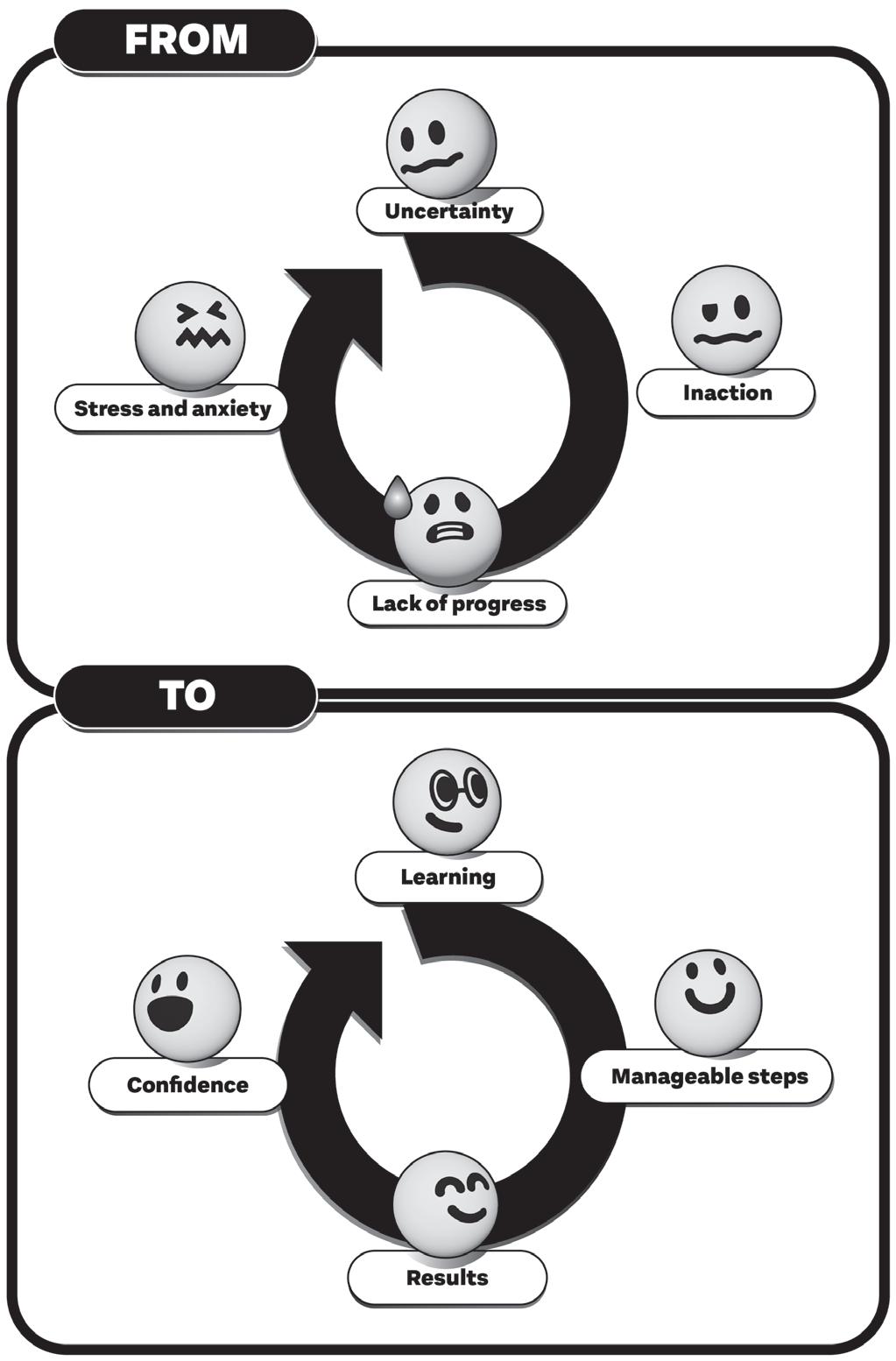
So let’s hold up the money mirror. What’s going on in your brain when it comes to your finances? What’s working? What’s not? What do you want to change? Yep, it’s time for a quiz . . .
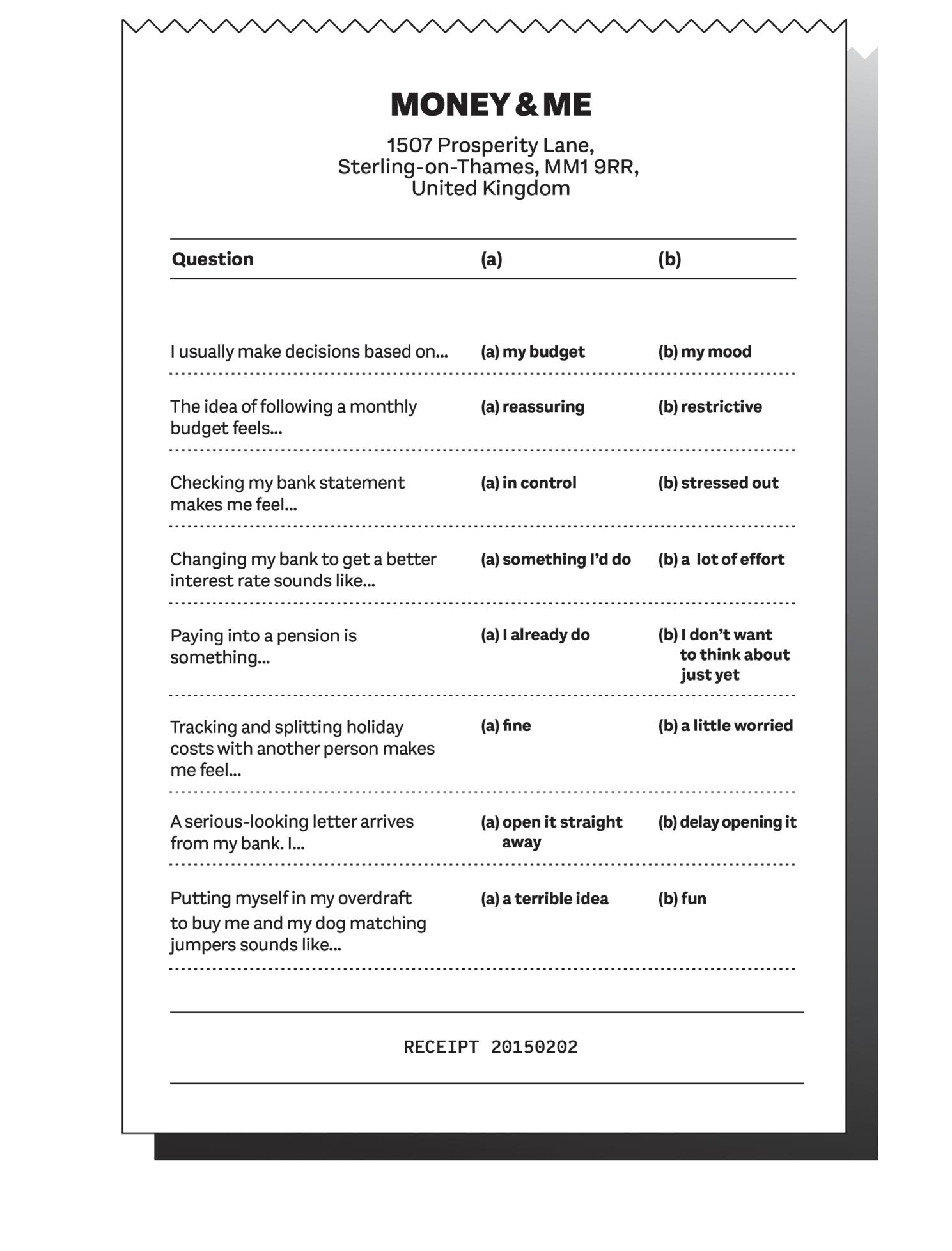
If you answered mostly a), you tend to make money decisions based on facts, not feelings. You probably have a budget, a plan and a back-up plan for the back-up plan. You’re on the right track, but don’t forget, it’s OK to treat yourself now and then.
If you answered mostly b), you go with your gut and live for quick wins. When things are working out, this feels great, but it can mean you’re not thinking ahead. Luckily, a bit of planning can make those splurges feel less risky.
If you answered a mix of the two, you might change your approach based on what’s going on in your life. Or perhaps you’re pretty confident with some aspects of money, like your monthly budget, but less sure about others, like interest rates. Whatever you answered, take a moment to notice what emotions popped up. Did you feel stressed? Anxious? Hungry? Take a deep breath and make yourself a snack, because wherever you’re starting from, we’ve got your back.
In the simplest terms, a financial goal is an objective that you set for your money. It’s worth reflecting on what yours might be before you dive into the rest of this book. A money goal can be for the short, medium or long term, and having one can help you focus on what really matters.
As our lives change – from leaving home, to having kids, and finally owning a full set of Volcanic Orange Le Creuset cookware – our goals will likely change, too. Broadly, we understand your financial life as having three stages. Transitioning from one stage to another can take years, and where you’re
at isn’t necessarily linked to your age. Setbacks are normal, progress isn’t linear, and you might find you don’t fit perfectly into one stage. Perhaps you’re starting afresh in your 50s after a divorce, or getting a boost in your 20s when your side hustle takes off. Think less age brackets, more Taylor Swift ‘Eras’.
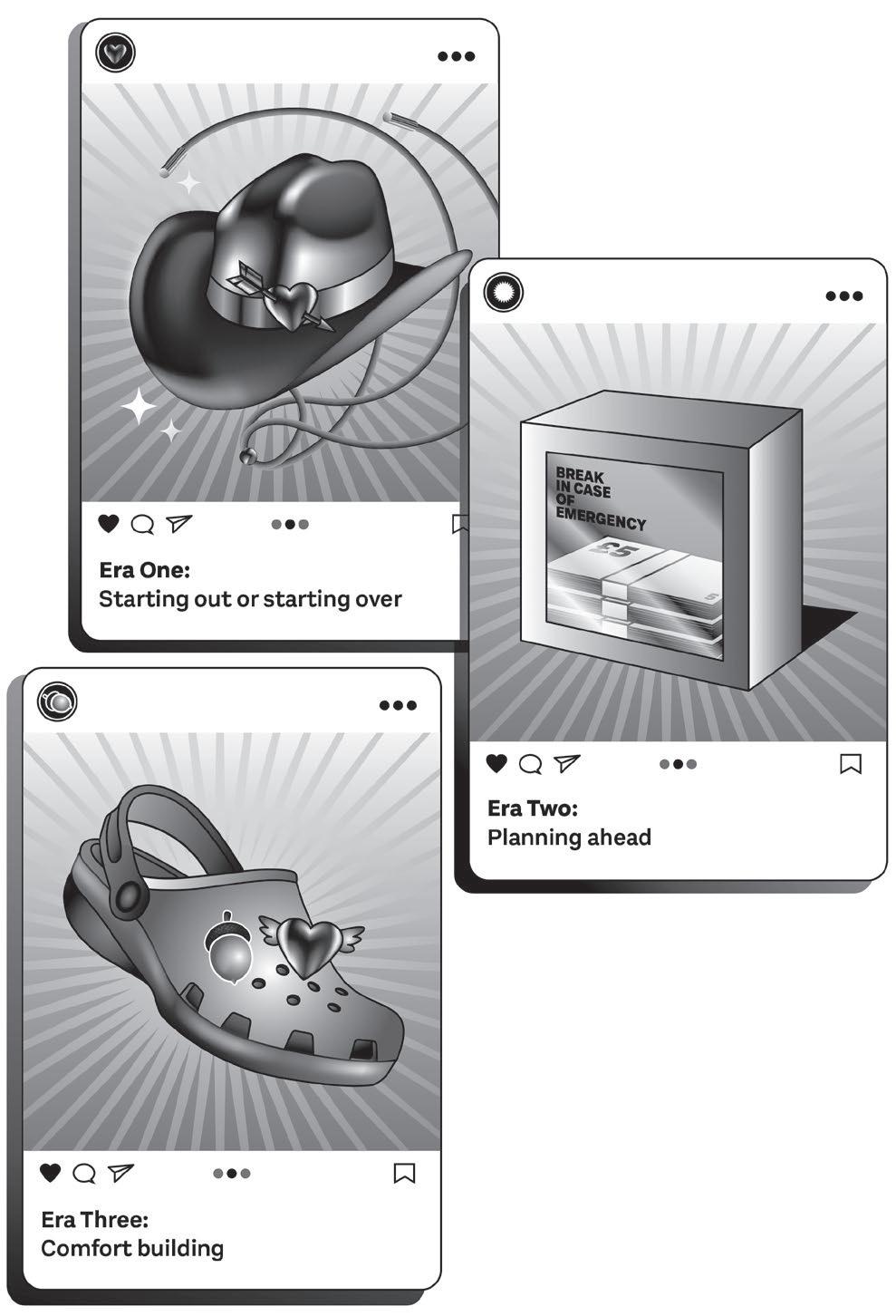
Whether you’re moving out of your family home, or recovering from a setback later in life, the goal is simple: survive. You’re living pay cheque to pay cheque, covering rent and bills, and maybe even saving a little bit for something fun.
Your goals in this era might include:
• Covering daily expenses
• Learning how to budget
• Setting money aside for fun, like nights out and gigs
• Paying off student loans or credit card debt
• Building a safety net – your emergency fund for unexpected costs
• Saving for something small but meaningful
• Earning a steady income
Now you’re juggling. You’ve got more than just survival on your mind – you’re trying to save for the bigger stuff while keeping the lights on. Maybe you’ve started thinking more about your future; saving up for a home deposit or putting more into your pension. You might be sharing finances with a partner, or taking on responsibility for kids or dogs (dogs are expensive).
Your goals now involve thinking both short term and long term:
10 The Book of Money
• Splurging on fancier treats
• Starting to support or look after others, like kids or ageing relatives
• Setting aside some fun money for holidays or social events
• Contributing regularly to your pension
• Paying off significant debts, like a car loan
• Preparing for career pivots or new side hustles
• Saving for a house deposit or a bigger place
You’re in a stronger position career-wise and financially, and you’re thinking more about the long game. You’re focused on thriving, not just surviving.
Your goals in this era might be:
• Paying off your mortgage
• Budgeting for bigger and better experiences
• Investing
• Reviewing your current pension plan or planning for retirement
• Saving for your kids’ future, or supporting ageing relatives
• Organising your will (sorting out what happens to your things when you’re gone)
Wherever you are, it’s easy to get caught up in what life should look like by now, because of family, friends, or perfectly
Looking in the money mirror 11
filtered social media feeds. Try not to compare. Just because your friend has a shiny new car, a six-word job title, or a massive Pokémon card collection, it doesn’t mean you’re falling behind. Progress rarely moves in a straight line, and that’s OK . The aim isn’t perfection, or becoming a briefcasetoting ‘money person’ who gets giddy over colour- coded expense charts. It’s all about finding what works for you.
We’re not going to give you advice or tell you exactly what to do. (Unless you’re Greg. Don’t buy that shirt, Greg. It doesn’t suit you .) But that won’t stop us from breaking down the basics, sharing stories inspired by our customers, and exploring tried-and-tested strategies that’ll help you feel more confident and capable than ever. We’ll start with the fundamentals of personal finance, like budgeting, sharing helpful hacks that have worked for literally millions of others. Then we’ll tackle the most complex topics in the simplest terms – think debt, investments, retirement and anything else that makes you want to run for the hills.
Read it in one go or dip in whenever you need to – you’re in charge!

With the introductions done, it’s time to get started. These principles are the seven key themes that will guide your financial journey. We found them carved into gold tablets deep inside an ancient cave . . . Well actually, they’re real methods tried and trusted by our Monzo community – real people, just like you, who’ve found what works for them. No archaeological expedition necessary.
You’ll see these principles pop up in every chapter. Let’s break them down so you can hit the ground running.
All good books need a hero and a villain. When it comes to the story of your money, think of compounding as the hero, and inflation as the villain. Once you understand how those two things can work for or against your money over time, everything else follows!
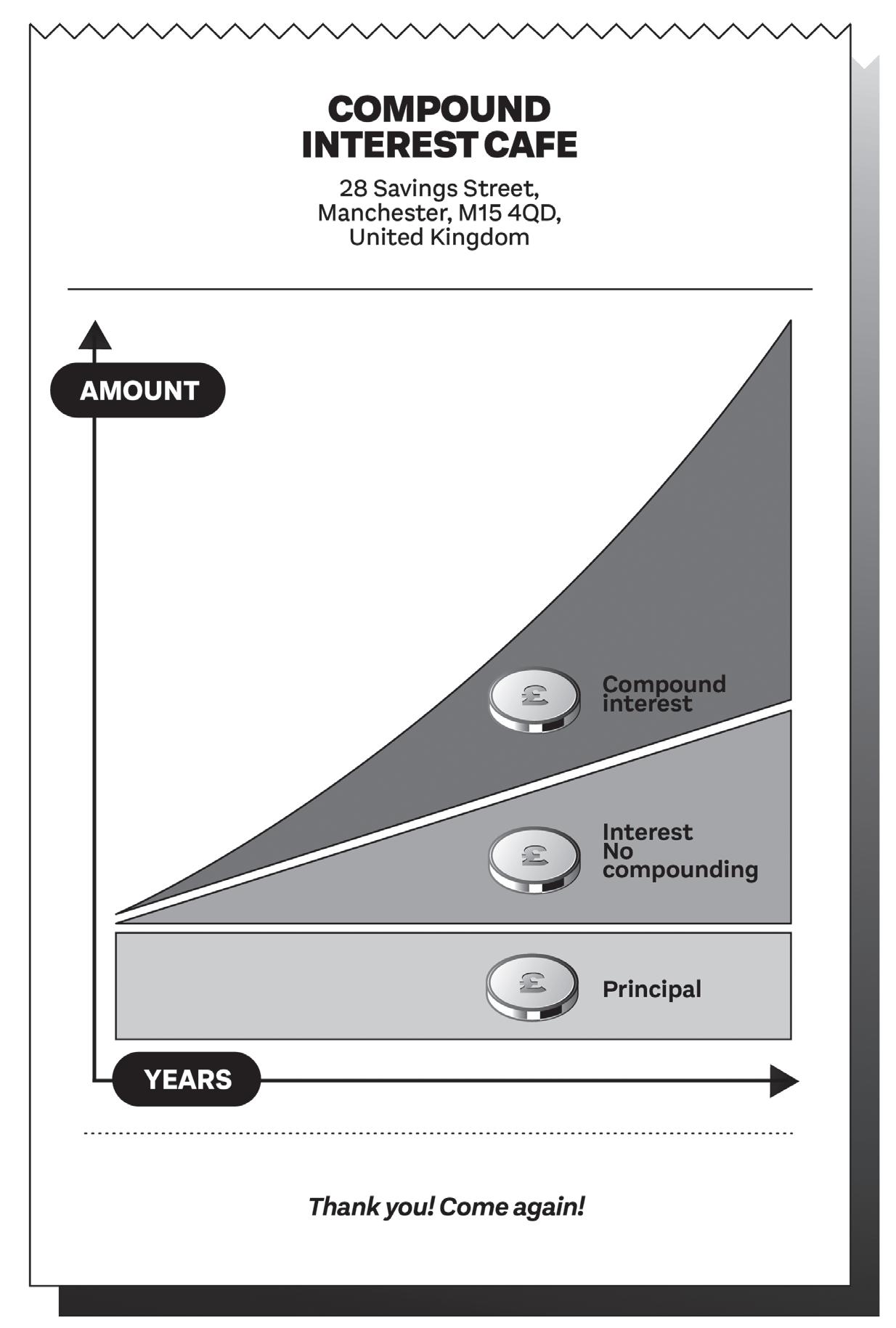
The hero: compound interest and returns
Einstein called compound interest the eighth wonder of the world, with good reason. When you leave your money to grow over time and don’t touch your savings, compounding is the interest you earn on your interest. Think of it as the financial version of ‘that escalated quickly’. It turns your money into a snowball that gets bigger as it rolls downhill. When you’re saving for the future over a long period of time, this changes everything.
And when you invest your money, you’re doing so in the hope you’ll benefit from compound returns. That’s when an investment does well and you reinvest what you’ve gained from it, to keep your money growing.
The villain: inflation
If compounding is your money’s best friend, then inflation is its enemy. Inflation is the rate at which things increase in price over time. It’s why you can buy less with the same amount of money today compared to five years ago.
That means if you let your money sit in an account that doesn’t earn any interest over the years, it’s slowly going to be worth less over time.
Patience over long periods of time is a superpower when it comes to managing your money. That’s because the longer you give your money to work for you, the bigger the rewards, all thanks to the power of compounding.
We’ll dig into compound interest, returns and inflation in lots more detail in the savings and investments chapters.
2. Pay yourself first ‘Pay yourself first’ is the short way of saying: when payday hits, squirrel away some money into your debt repayments,
The Book of Money
savings and investments before you buy anything. This should be the first thing we do, but more often than not, we only save what we have left. Instead, you should think of your savings as a salary that you pay to your future self.
Think about the joy of finding a tenner stuffed in a pocket of a jacket you haven’t worn in ages. That’s what paying yourself first feels like – a gift from your past self to your future self.
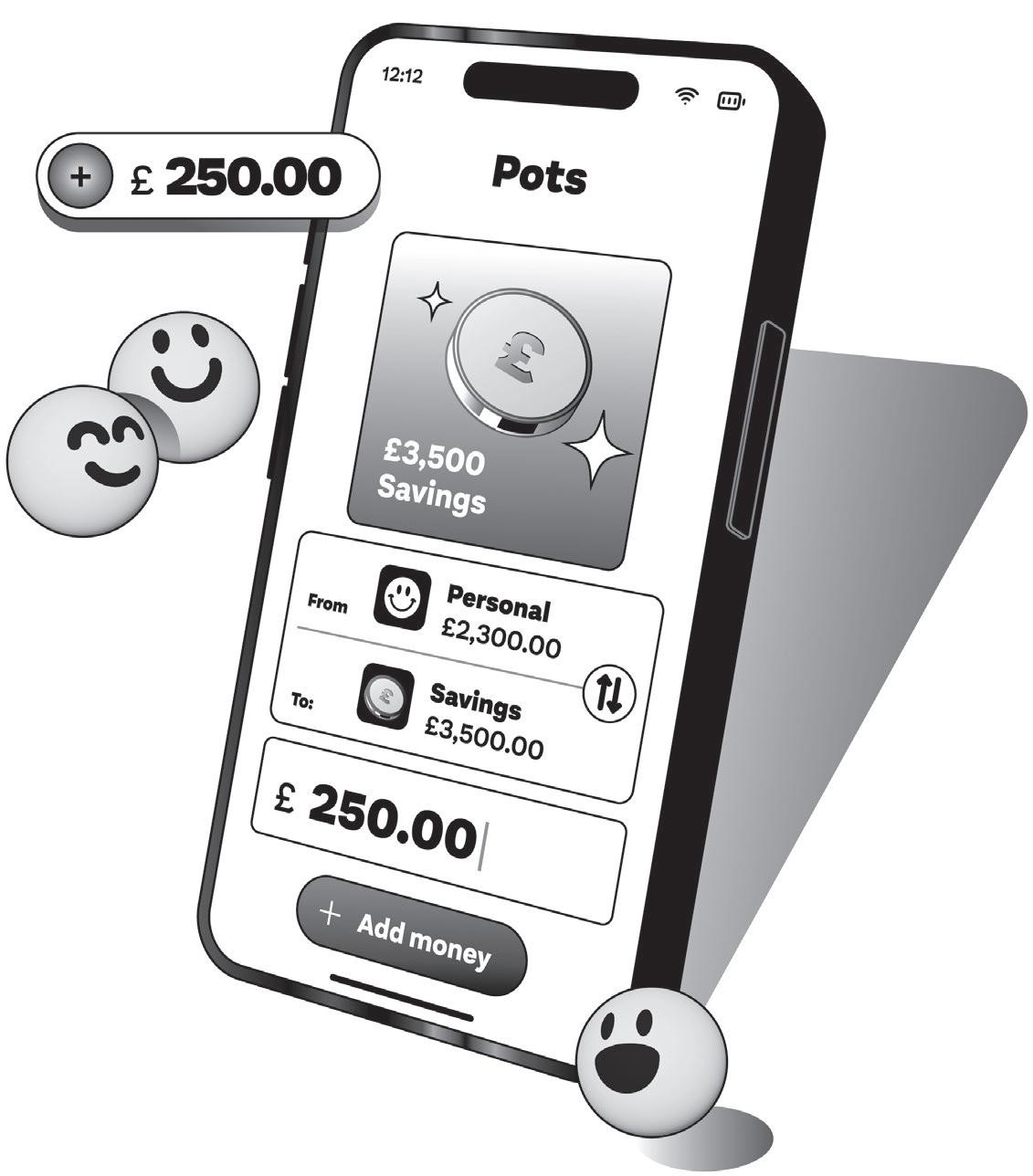
Sure, your present self might want to swipe that cash and spend it, but if you put in enough systems and reminders to stop this from happening, your future self will thank you.
Starting with even the smallest amount can make a big difference. It will add up. It will help cushion you in an emergency. And most importantly, it will build a habit. Make this task even easier by automating your savings – set it up once, and you won’t have to think about it.
This book will talk a lot about the hows of managing money, but you’ll need to find your own personal whys to stay motivated. These whys will be the driving force behind every financial decision you make. Maybe you dream about going on a luxury trip, moving to a brand new city, or simply building up a
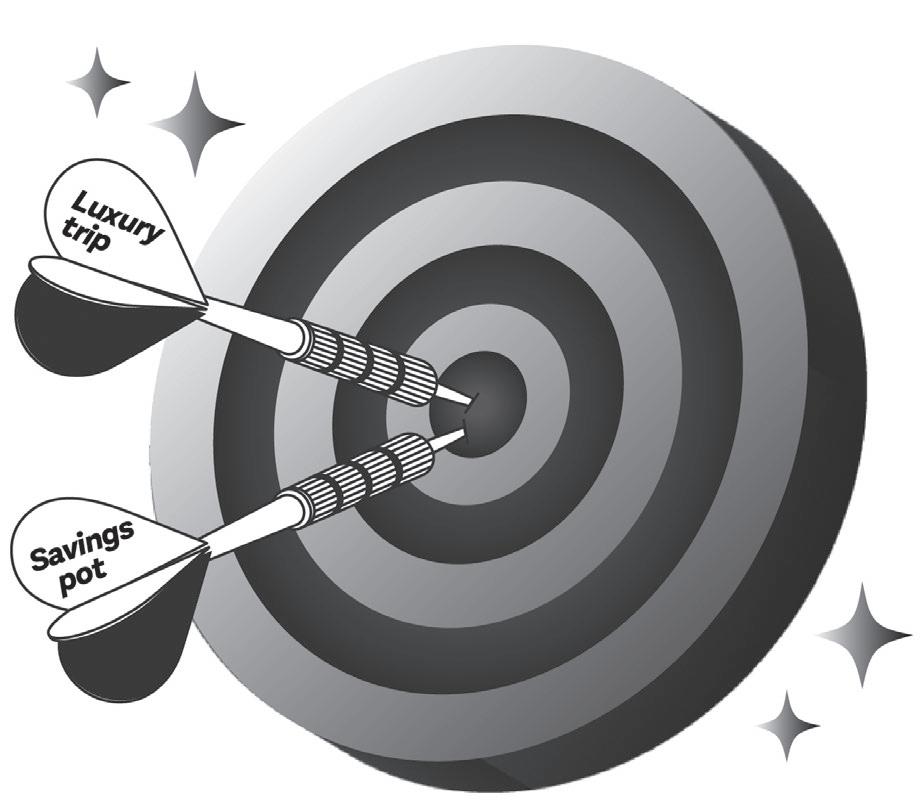
18 The Book of Money
savings pot. Whatever it is, having a goal will give your money intention and help you focus on the things that really matter to you. And did you know, writing your goals down (or finding pictures that represent them) can make a huge difference to whether or not you’ll actually achieve them.1 Neuroscience shows that when you write down your goals, you’re using both the logical and creative parts of your brain, which boosts your chances of success.2 Plus, getting them down on paper makes them real and tangible, helping you prioritise them.
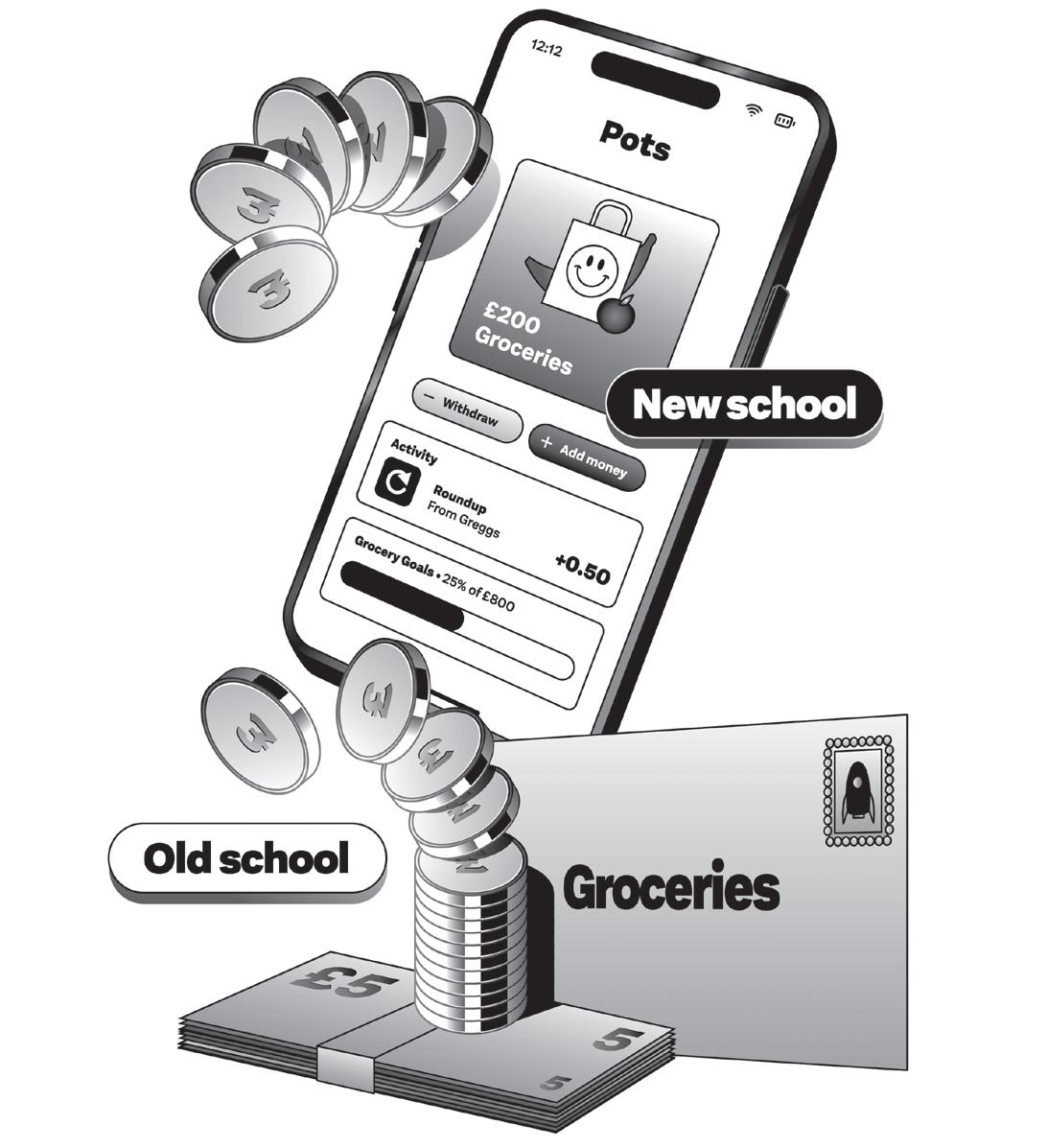
The envelope method is an old-school way to manage your money, but like quality denim or your nana’s dating advice, it still holds up. You label envelopes with categories like rent, food and entertainment, and then stash the cash you’ve budgeted for each inside. Once the envelope’s empty, that’s it – no more spending on that category. Today, you can do this digitally using banking apps, by allocating your income to different ‘pots’. The idea is exactly the same: give every pound a job and keep an eye on where it’s going. Just don’t forget to include an envelope for paying yourself first! We’ll cover this in detail in the ‘Balancing your budget’ chapter.
Generally speaking, you’ll have money coming in – your income – and money going out – your expenses. Over time, you’ll also want to keep some of that money aside for savings and investments. That third category might not always be a priority, like when you’re younger or if you’re focusing on repaying debts, and that’s OK . You just want to get in the habit of building it up over time, because it’ll help you create financial security for the future. You can boost how much you put into it by spending less, earning more, or both! Your income might increase if you get a pay rise, pick up a side hustle as a Vinted mogul, or claim all the benefits you’re entitled to. Your expenses might decrease if you curb a coffee habit or a child moves out. Building the percentage that goes
20 The Book of Money in that third pot over time really does add up (thanks to that sweet, sweet compound interest).
Think of it this way: if you spend £4.50 on a coffee, once you drink it, it’s gone – no lasting impact. But if you use that £4.50 to plant a coffee bean, you’ll get a coffee plant, and over time that plant can produce enough beans to make many cups of coffee. It’s like ‘teach a man to fish’ but you’re way more caffeinated. Increasing how much you invest and save of your income is like growing the plant – it can provide you with more value in the future, helping you build wealth rather than living pay cheque to pay cheque.
It’s totally normal to notice what your friends are spending their money on, but things get tricky when you start measuring your own success against their purchases. Whether it’s upmarket restaurants, a new car, or a flat with a south-facing balcony, comparing yourself to others can send you spiralling into self-doubt and impulse buys.
The truth is that everyone’s money situation is different and, more importantly, you’ll never get the full story. Some friends might seem to have endless cash but could be racking up debt. Others might appear to have effortlessly saved for a house deposit but were actually gifted money by their parents. Instead of trying to match what they have or feeling guilty about what you don’t, it’s important to stay grounded in your own financial realities and goals. So stick to your own values, know your limits, and steer clear of the comparison game. Which brings us to . . .

Every time you reach a money milestone, take a moment to celebrate. Whether you’ve paid off a credit card, saved your first £1,000, or added a bit extra to your pension, these are all steps towards even bigger wins. And keep the momentum going when you’re on a roll – so if you’re celebrating spending less money, don’t do it by spending more money! And here’s